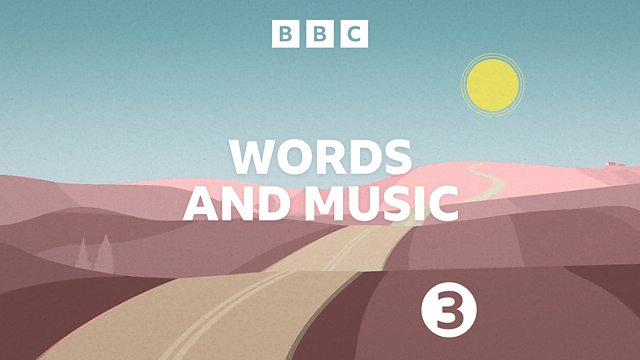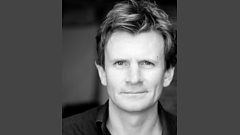
Strauss 150: Strauss's Library
Texts and music focusing on Richard Strauss, with readings by Charles Edwards and Pooky Quesnel. Including Goethe, Wilde and Nietzsche, plus Mozart and Strauss.
Strauss 150: Strauss's Library
In this special edition of Words and Music, Charles Edwards and Pooky Quesnel delve into Richard Strauss's library and imagination. Strauss was an avid reader and, like many of his contemporaries, was extremely well versed in the writings of Goethe. He was also fascinated by the literature of Ancient Greece, modelling his operas on works by Sophocles, as in the example of Elektra.
This edition of Words and Music weaves a Goethe strand - texts by Goethe or inspired by Goethe - with a strand on texts that Strauss used in his operatic works. There are also letters from his correspondence with his librettist Hoffmannsthal and modern poems on subjects that inspired Strauss, from the stories of Salome to Ariadne.
Strauss loved Mozart, Wagner and Couperin. The music of these composers features alongside that of Strauss himself.
Last on
Music Played
Timings (where shown) are from the start of the programme in hours and minutes
-
![]() 00:00
00:00Richard Strauss
Also sprach Zarathustra (opening extract)
Performer: Tonnhalle Orchestra Zurich, David Zinman (conductor).- ARTE NOVA 74321984952.
- CD3 Tr3.
-
Nietzsche
Zarathustras Prologue (Also sprach Zarathustra), read by Pooky Quesnel
Richard Strauss
Recollections and Reflections (extract), read by Charles Edwards
![]() 00:05
00:05Johann Sebastian Bach
Contrapunctus I (Die Kunst der Fuge, BWV.1080)
Performer: Pierre-Laurent Aimard (piano).- DG 477 7345.
- Tr1.
Nietzsche
An Goethe (To Goethe), read by Pooky Quesnel
![]() 00:09
00:09Richard Strauss
Jochanaan! Ich bin verliebt in deinen Leib (Salome)
Performer: Emmy Destinn (soprano), Orchestra conducted by Bruno Seidler-Winkler.- NAXOS 8.111014-15.
- CD2 Tr7.
Oscar Wilde
Salome (extract), read by Charles Edwards and Pooky Quesnel
![]() 00:12
00:12Richard Strauss
Dance of the Seven Veils (Salome)
Performer: Berlin Phiilharmonic, Georg Solti (conductor).- DECCA 452 603-2.
- Tr11.
Dorothy Parker
Salome's Dancing-Lesson, read by Charles Edwards
![]() 00:21
00:21Wolfgang Amadeus Mozart
IV Menuetto (Serenade in B-flat major, K.361 Gran Partita)
Performer: Winds of the Berlin Philharmonic.- ORFEO C188891.
- Tr4.
![]() 00:26
00:26Richard Strauss
Allein! Weh, ganz allein (extract from Elektras Monolgue, Elektra)
Performer: Astrid Varnay (Elektra), Orchester der Deutschen Oper am Rhein, Arnold Quennet (conductor).- ORFEO C 661 041 B.
- Tr1.
Sophocles
Electra (scene 2), read by Pooky Quesnel
![]() 00:31
00:31Richard Strauss
Lully Minuet (Der Buerger als Edelmann-Suite, Op.60)
Performer: Joseph Wolfsthal (violin), Berlin State Opera Orchestra, Richard Strauss (conductor).- GEMM CD 9366.
- Tr7.
Francis Howard Williams
Electra (scene 2), read by Charles Edwards
![]() 00:34
00:34Louis Couperin
Prelude (Suite in C minor)
Performer: Christophe Rousset (harpsichord).- AP006.
- CD2 Tr1.
Pierre Choderlos de Laclos
Liaisons dangereuses (Volume 4 Part 1), Letter CXXV (extract), read by Charles Edwards
![]() 00:36
00:36Richard Strauss
Waltz Movements (Suite from Der Rosenkavalier)
Performer: The Augmented Tivoli Orchestra, Richard Strauss (conductor).- KOCH 3-7132-2 H1.
- Tr2.
![]() 00:40
00:40Wagner trans. Liszt
O du mein holder Abendstern (Romance from Tannhauser)
Performer: Louis Lortie (piano).- CHANDOS CHAN 10793.
- Tr3.
Richard Strauss
Letter to Hoffmannsthal, Garmsich 1. 6. 1925 (extract), read by Charles Edwards
Heine, trans. Charles Godfrey Leland
To a Quondam Follower of Goethe, read by Pooky Quesnel
![]() 00:44
00:44Richard Strauss
Gefunden, Op.56 No.1 (Goethe)
Performer: Dietrich Fischer-Dieskau, Gerald Moore (piano).- EMI CMS 763995 2.
- CD5 Tr1.
![]() 00:46
00:46Ludwig van Beethoven
Adagio quasi un poco andante (String Quartet in C sharp minor, Op.131 No.6)
Performer: Medici String Quartet.- NIMBUS NI 1785.
- CD7 Tr10.
Sylvia Plath
To Ariadne (deserted by Theseus), read by Charles Edwards and Pooky Quesnel
![]() 00:48
00:48Richard Strauss
Es gibt ein Reich (Ariadne auf Naxos, Act 1)
Performer: Deborah Voigt (soprano), Bavarian Radio Symphony Orchestra, Richard Armstrong (conductor).- EMI 557681-2.
- Tr7.
![]() 00:53
00:53Richard Strauss
Andante for horn and piano, Op.Posth.
Performer: Barry Tuckwell (horn), Vladimir Ashkenazy (piano).- DECCA 430 370-2.
- Tr4.
Hofmannsthal
Letter to Strauss, Rodaun, 20.3.(1911), read by Charles Edwards
![]() 00:58
00:58Richard Strauss
Aus unsern Taten steigt ein Gericht! (Die Frau ohne Schatten, Act 3)
Performer: Cheryl Studer (The Empress), Bavarian Radio Symphony Orchestra, Wolfgang Sawallisch (conductor).- EMI CDC 749075/77 2.
- CD3 Tr5.
Stefan Zweig
The World from Yesterday (extract), read by Charles Edwards
![]() 01:02
01:02Richard Strauss
Potpourri (Die schweigsame Frau)
Performer: Bavarian State Opera Orchestra, Joseph Keilberth (conductor).- TELDEC 843446.
- Tr8.
![]() 01:06
01:06Richard Strauss
Cacilie, Op.27 No.2 (Heinrich Hart)
Performer: Jonas Kaufmann (tenor), Helmut Deutsch (piano).- HMC 901879.
- Tr8.
James Wright
Three stanzas from Goethe, read by Pooky Quesnel
![]() 01:09
01:09Richard Strauss
Metamorphosen study for 23 solo strings (extract)
Performer: Vienna Philharmonic, Andre Previn (conductor).- PHILIPS 4201602.
- Tr1.
Goethe
The Metamorphosis of Plants (poem, opening extract), read by Pooky Quesnel
Goethe
The Metamorphosis of Plants - Introduction (study, opening), read by Charles Edwards
Producer's note
Strauss was a highly-cultivated reader and like many of his contemporaries, was extremely well versed in Austro-German culture and its literary canon from Goethe to Nietzsche.�� He spent his life reading and re-reading particularly the poetic and scientific works of Goethe. ��The only work by Goethe that he disliked was Farbenlehre, the treatise on colours. ��His many songs set the poems of much-loved German poets like Schiller, Rückert, Uhland, Eichendorff, Hesse, Morgenstern and Herder alongside Goethe, and also poets who have since faded into obscurity.
��
Goethe weaves through this edition of Words and Music, from Strauss’s own comments on the great poet in his Recollections and Reflections, to short extracts from Goethe’s The Metamorphosis of Plants, which inspired Metamorphosen, Strauss’s bleak and grief-filled elegy for Dresden’s Semper Opera House that lay in ruins at the end of the Second World War. ����Along the way, Nietzsche, Heine and James Wright pay homage to Goethe, and Dietrich Fischer-Dieskau sings one of Strauss’s Goethe settings, Gefunden, Op.56 No.1 (I walked in the woods just as I pleased).
��
Strauss also enjoyed his creative partnerships with two great contemporaneous literary figures – Hugo von Hoffmansthal and then Stefan Zweig.�� There are a couple of letters between Strauss and Hoffmannsthal in this programme and also an extract from Stefan Zweig’s The World of Yesterday that recounts his delight at being approached by Strauss to become his librettist after the death of Hoffmannsthal, a position that protected his work to some extent from the Third Reich campaign to burn books that were seen to undermine their authority.��
��
Strauss was also fascinated by Ancient Greece and, in his last written note, dated July 1949, described himself as a ‘Greek German’.�� He had travelled to Greece in 1892 and again in 1926, and drew upon ancient Greek literature by Sophocles, Euripides and Stesichorus for the operas Elektra and Die ägyptische Helena.�� His late operas, Daphne and Danae were also created out of Strauss’s classical spirit.�� Strauss believed that Latin and Greek should be part of an educated European’s education and, moreover, should be studied in the original.��
��
Baroque France was another cultural strand in Strauss’s library.�� He adored the music of Couperin and had read the courtly works of Moliere, Pierre Choderlos de Laclos and Jean Babtiste Louvet de Couvray whose tales of chivalry were loosely woven into ‘Rosenkavalier’.�� Christophe Rousset plays from Couperin’s Suite in C minor as Charles Edwards reads a tale of seduction from Les Liaisons dangereuses, followed by Waltzes from Der Rosenkavalier conducted by Strauss himself.
��
In this edition of Words and Music, there are also seminal moments from Strauss’s best-known operas coupled with the texts that inspired their libretti.�� Salome attempts to kiss Iokanaan’s mouth in Oscar Wilde’s play, which is followed by Dorothy Parker’s poem Salome’s Dancing-Lesson read over Solti’s recording of The Dance of the Seven Veils.�� Sir Georg Solti met Strauss during his time in Munich and conducted a performance of Rosenkavalier there to celebrate the composer’s 85th birthday.���� Elektra’s Monologue sung by Astrid Varnay, the most sought-after Elektra for over 20 years, is paired with Electra’s monologue from the beginning of Sophocles play.
��
Strauss loved the music of Mozart, Beethoven and Wagner, all of whom are represented in this programme.�� I have chosen chamber works for all three composers to tie in with the intimate setting of Strauss’s library.�� In the same way that Goethe is the great original of Austro-German literature, Bach may be seen as the figurehead of Austro-German music.�� The first mention of Goethe in the programme is accompanied by Pierre-Laurent Aimard playing from Bach’s Die Kunst der Fuge.�� I have also included Strauss’s Andante for horn and piano, which he composed in 1888 for the silver wedding of his parents.�� His father was an eminent horn player and a formative musical influence on the young Strauss (although Strauss did later learn to love Wagner against his father’s will).
��
By delving into the books and scores that Strauss would have kept in his library, this programme hopes to provide a glimpse into Strauss’s imagination.
��
Elizabeth Arno (producer)
Broadcast
- Sun 8 Jun 2014 17:30����ý Radio 3
The hidden history of plant-based diets
Books website
Get closer to books with in-depth articles, quizzes and our picks from radio & TV.
Gallery



